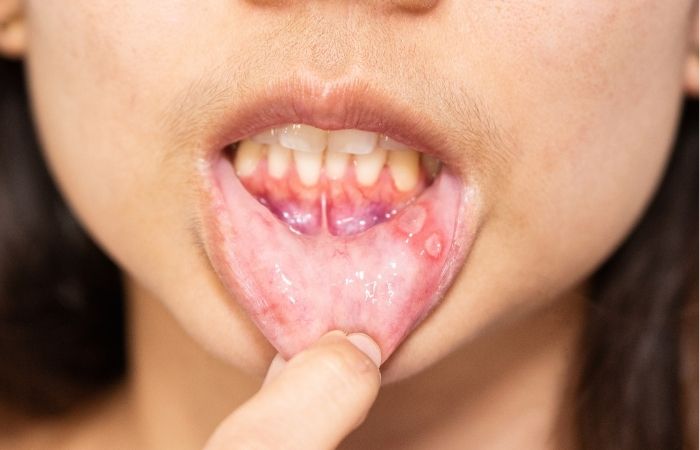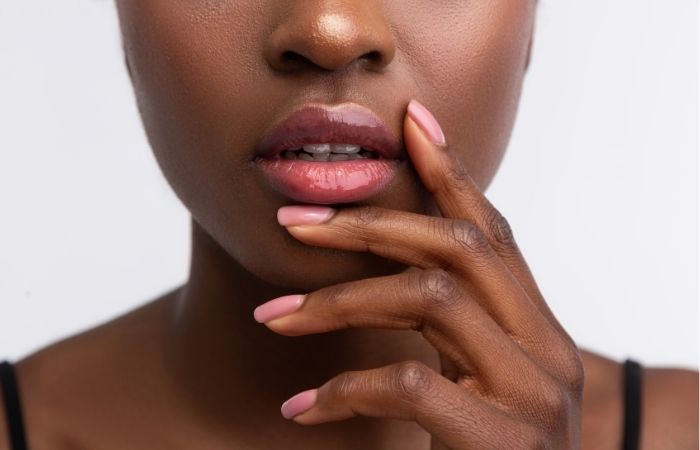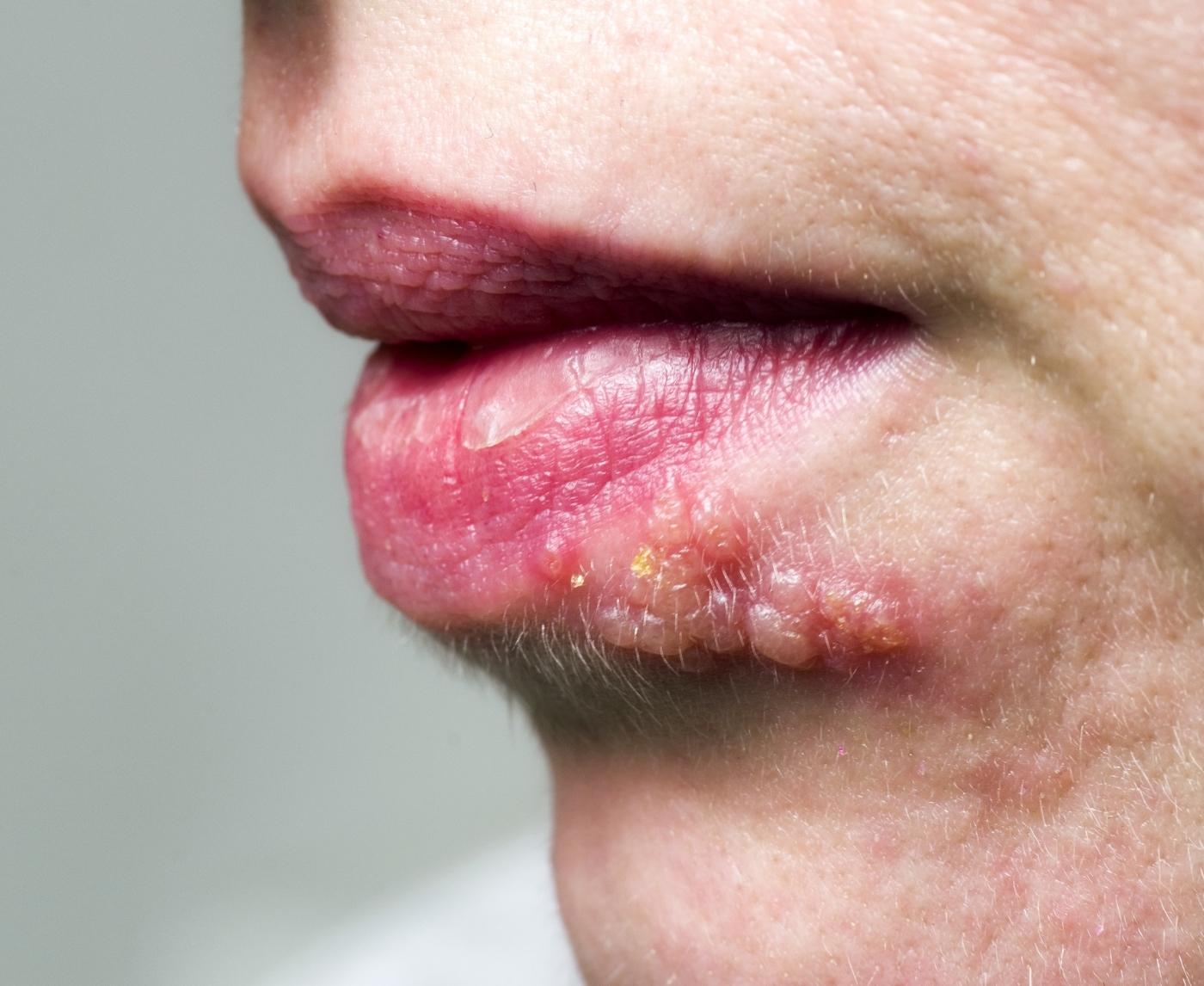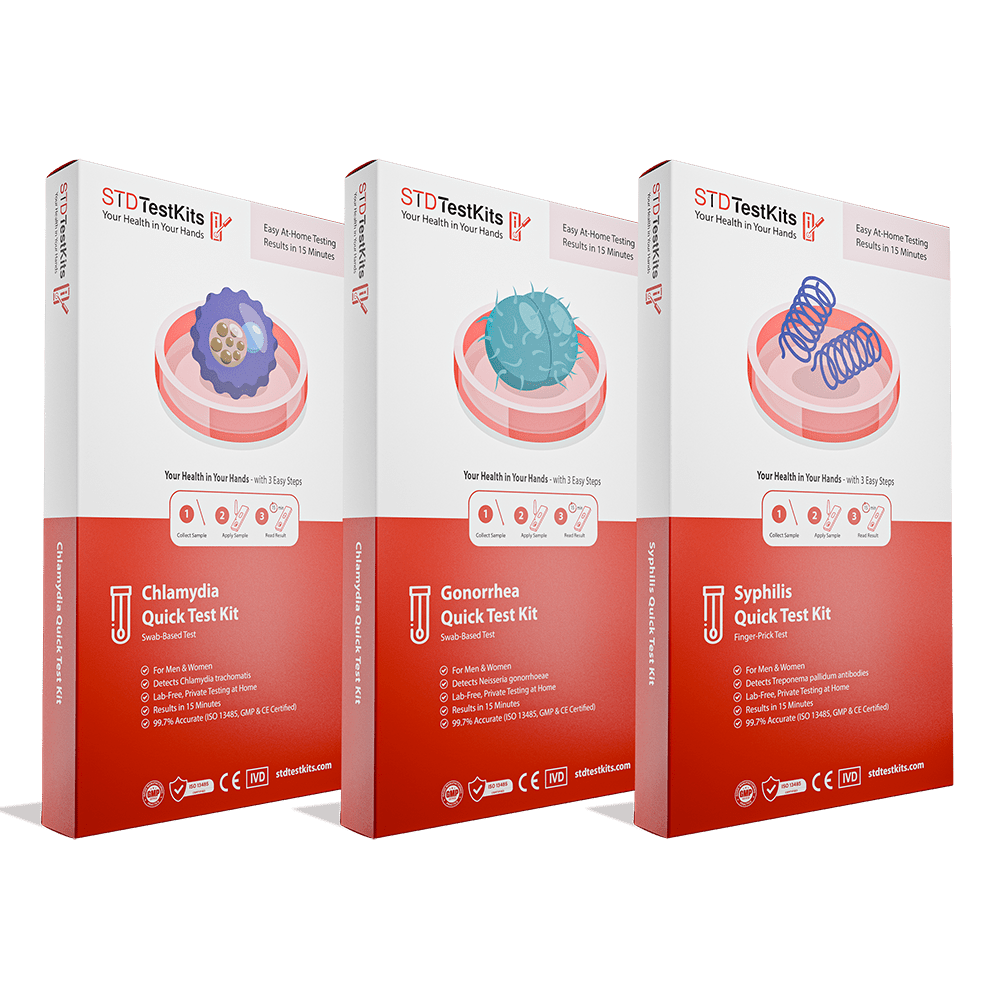You Can Get an STD from Oral Sex, Here’s How It Happens
Quick Answer: A cold sore is caused by the herpes simplex virus, usually HSV-1. It’s not “just” a cold sore. It’s a sign of oral herpes, and yes, it can spread even when you don’t feel symptoms. Testing is the only way to know for sure, and to stop the cycle of transmission.
This Isn’t Just Dry Lips, It’s a Viral Pattern
Let’s get honest. If you’ve ever chalked up that lip blister to stress, dehydration, or “just a cold sore,” you’re not alone. The reality? That phrase, just a cold sore, is one of the most successful public health cover-ups of the past century. Because cold sores are herpes. Specifically, oral herpes caused by the herpes simplex virus type 1 (HSV-1).
According to the CDC, nearly 50% of Americans have HSV-1 by their 20s, and more than 80% carry it by midlife. The World Health Organization estimates the global infection rate at a staggering 67% of people under 50. That means most people are already carrying herpes, many without ever realizing it.
And here’s the twist: HSV-1 isn’t just oral anymore. It's increasingly responsible for genital herpes cases, passed through oral sex. Because most people don’t test. Most people don’t talk about it. And most people believe herpes looks like something “worse.”

People are also reading: Why Syphilis Is Spiking Among Straight Men, and Why It Matters
“I Thought It Was From Chapstick”
Ty, 28, noticed his first cold sore after a weekend camping trip. “I figured it was just windburn or cracked skin. I’d kissed someone new, but it didn’t even cross my mind it could be herpes,” he said. It wasn’t until a second sore emerged, this time with a raw, burning edge, that he went to urgent care. The swab came back positive: HSV-1.
“I was floored. I thought herpes looked... worse. You know? Big outbreaks, fever, all that. No one told me a tiny cold sore was it.”
Ty’s story is painfully common. And not just among those who’ve had oral sex. Herpes can spread through kissing, shared lip balm, or even face-to-face skin contact when the virus is shedding.
What’s less known: up to 70% of transmission happens when the person has no visible symptoms at all.
When Silence Is a Symptom Too
Herpes has a way of hiding in plain sight. For some, it starts with a tingle. Others feel an itch, a pinch, or the unmistakable pulse of a blister blooming under the skin. But here’s the kicker: many people infected with HSV never show symptoms, or don’t recognize them as herpes when they do.
That’s part of why herpes continues to spread. It’s not about promiscuity. It’s about invisibility. And silence. If you’re told it’s “just a cold sore,” why would you think to test? Why would you warn a partner? Why would you worry about protection during oral sex?
We don’t get told that kissing can transmit herpes. We don’t learn that condoms don’t fully prevent it. And we definitely don’t get taught that “harmless” cold sores could spread to someone’s genitals.
One 2023 study published in the journal Sexually Transmitted Diseases found that more than 60% of patients who tested positive for HSV-1 had never been diagnosed, and nearly half said they had no idea cold sores were a form of herpes at all.
This isn’t about shaming people into disclosure. It’s about equipping people with real knowledge. With tools. With the truth.
This Isn’t a Pimple, And It’s Not Your Fault
Let’s clear up one of the most damaging myths right here: herpes does not look the same for everyone. Sometimes it’s a full-blown blister cluster. Sometimes it’s just a dry patch that feels irritated. Sometimes it looks exactly like a pimple, and is treated like one, until it comes back again.
Many people confuse herpes lesions with acne, ingrown hairs, allergic reactions, even eczema. The early stages often include symptoms like itching, tingling, or burning, well before a blister forms. And yet, unless those blisters show up in textbook clusters, most cases get dismissed. Not just by the person affected, but often by primary care providers too.
That’s why so many folks go undiagnosed for years. Because herpes doesn’t scream when it shows up. It whispers. And if you don’t know what to listen for, you might never connect the dots.
So What Should a Cold Sore Look Like?
That depends on your body, and how long the virus has been there. A first outbreak may cause a painful lesion or group of fluid-filled blisters. Later outbreaks? Maybe just one tiny sore that scabs over quickly. Or no visible lesion at all, just a feeling that something’s off around the lips or mouth.
Here are some of the real-world patterns people describe in oral herpes flare-ups:
• A sharp stinging sensation in the same spot before each outbreak
• One bump that looks like a zit, but hurts to the touch
• A scab that forms without a blister stage, then cracks while talking or eating
• Recurring “cracks” in the corner of the mouth
None of these are definitive. That’s the frustrating part. But they are clues, your body’s way of saying, “You might want to get this checked.”
Testing: Why, When, and What to Expect
Let’s say that sore on your lip shows up every few months. Or maybe it’s brand new, and you’re freaking out. Should you get tested? The answer isn’t always black and white, but testing can be incredibly helpful for both physical and emotional clarity.
The most accurate way to confirm herpes is through a viral swab, done by a clinician within 48 hours of symptom onset. That means you need to act fast when symptoms appear. A dry or healing sore won’t offer enough viral material to confirm infection.
If you're between outbreaks, a blood test (type-specific herpes IgG) can check for antibodies to HSV-1 or HSV-2. But this test doesn’t tell you where the virus lives in your body, or when you got it. It also isn’t typically included in routine STD panels, you have to ask for it.
Testing isn’t just about diagnosis. It’s about decisions. If you’re sexually active, testing lets you have informed, honest conversations with partners. If you're pregnant or planning to be, testing can prevent transmission during delivery. And if you’re living with recurring outbreaks, confirmation allows you to explore treatment that could change your daily life.
“My Partner Got It From Me, and I Didn’t Even Know I Had It”
Dana, 33, had never had a cold sore in her life. But when her girlfriend developed what looked like a rash near her lip after a makeout session, she suggested they both get checked. Dana’s results? HSV-1 positive. So was her partner.
“I didn’t know you could pass it when you weren’t having symptoms. I felt awful. She didn’t blame me, but I blamed myself.”
That guilt? It’s one of the biggest barriers to testing. But herpes doesn’t need shame to thrive, it just needs silence. Once Dana knew her status, she started using daily suppressive antivirals and now informs every new partner upfront. She says it’s changed everything.
“I finally feel like I’m in control. I wish I had tested years ago.”

People are also reading: My Partner Has HPV. Am I at Risk, And What Should I Do Next
You Don’t Have to Wonder, You Can Know
Still sitting with that “maybe” in your mind? That’s a heavy place to be. The itch, the worry, the late-night Googling. And the truth is, a lot of people stay stuck in that place for months, even years. They wait for a “real outbreak” before they act. But herpes doesn’t follow your rules. It lives on its own clock.
Getting tested isn’t about paranoia, it’s about empowerment. When you test, you stop guessing. You stop wondering if you’re the one passing it without knowing. You stop feeling like you have to downplay what your body is trying to say.
Whether you’re managing a new sore or just want to be sure, an at-home oral herpes test can give you fast, private, doctor-trusted answers. STD Test Kits offers discreet solutions that don’t involve awkward waiting rooms or uncomfortable conversations with providers who might minimize your concerns.
Because that tiny bump on your lip? It’s not worth ignoring. But it’s also not worth fearing. You deserve real answers.
What Happens If You Test Positive?
First, take a breath. Seriously, pause here. Because even if that test confirms HSV-1 or HSV-2, what it doesn’t confirm is the end of your sex life, your desirability, or your future. It confirms something you already had, and something that millions of people are living with, managing, and thriving through every day.
Testing positive doesn’t mean you’ll get frequent outbreaks. Many people have one flare-up and then nothing for years. Others learn to recognize their body’s early warnings: fatigue, stress, sunburn, illness. These are common triggers for reactivation, and once you spot the pattern, you can often get ahead of it.
Doctors may recommend suppressive therapy, daily low-dose antivirals that reduce the frequency and severity of outbreaks and lower transmission risk. For many, this treatment brings huge peace of mind, especially in relationships. But the choice is always yours. You don’t have to medicate unless you want to. What matters is that you’re informed.
“I Still Hook Up, But Now I Talk About It”
Luis, 26, was diagnosed with oral herpes after his first boyfriend got tested and came back positive. “We had both assumed we were clean because we’d never had any symptoms. But I got a swab during a routine dental visit because I had a crack on my lip. Boom, HSV-1.”
“At first, I spiraled. I thought no one would want me. But then I got on Reddit and TikTok and realized how many people were living totally normal lives. Some even said their sex life got better after diagnosis, because it forced more honest communication.”
Now Luis discloses early. He keeps antivirals on hand and feels more empowered than ever. “I’ve had people say thank you. Like, actually thank me for telling them. That flipped everything for me.”
Living with Herpes Isn’t About Avoiding Touch, It’s About Embracing Clarity
Herpes stigma isn’t rooted in science. It’s rooted in sexual shame. Because when we talk about herpes, we’re really talking about who gets to feel clean. Who gets to feel worthy. And the truth is, you are not dirty. You are not dangerous. You are not alone.
Sex doesn’t end after diagnosis. In fact, it often becomes more intentional, more connected, and more joyful. Disclosure becomes a filter. The people who freak out? They’re telling you who they are. The ones who listen, ask questions, and stay? That’s your green flag.
Herpes doesn’t care about your gender, your orientation, or your body count. It can be passed through kissing, cuddling, oral sex, shared razors, or lip balm. So let's be real: this isn’t about punishment. It’s about proximity, and biology.
That’s why it’s vital we stop framing herpes as a cautionary tale and start framing it as a common part of human skin-to-skin intimacy. Yes, there are smart ways to lower risk. Yes, you can use barriers, meds, communication. But none of this makes you “safer” or “better.” It just makes you informed.
“I Didn’t Know It Could Be Passed Through Oral Sex”
Shanice, 31, tested positive for genital HSV-1 after a one-time hookup with a guy she’d known since college. “He didn’t have any sores. He didn’t mention anything. It was literally one night. I thought I was being safe.”
When she called him, his voice cracked. “He said he’d had cold sores since he was a kid but didn’t think they counted. He had no idea he could pass them like that.”
Shanice’s diagnosis was devastating at first, but it eventually led her to discover what she calls her “sexual reset.” She went on suppressive meds, joined a herpes-positive dating forum, and now uses her story to educate others.
“I talk about it openly now. People need to know cold sores aren’t harmless. But also? I still have sex. I still date. I still feel beautiful.”
Your Mouth Isn’t a Risk Zone, It’s Part of Your Sexual Health
We’re long overdue to treat our mouths the same way we treat our genitals: as part of our sexual health. That means checking for sores. That means asking about history. That means talking about testing, not just for chlamydia and gonorrhea, but for HSV-1 and HSV-2 too.
More and more clinicians are starting to recommend herpes testing for people with recurring oral symptoms, even if the person doesn’t identify the sores as outbreaks. And in queer and polyamorous communities, testing for oral STDs is becoming a baseline norm, not a panic move.
Whether you’ve had one cold sore or a lifetime of them, you deserve to know what’s going on in your body. You deserve care that doesn’t minimize or shame you. And you deserve sex that feels safe and confident, not confusing and silent.
So if your lip is tingling, if your sore keeps coming back, if your partner has questions, or if you just want clarity, get tested. This at-home combo kit checks for multiple STDs, including herpes, discreetly and quickly. Your mouth deserves answers too.

People are also reading: Syphilis Is Surging in Alabama, Don’t Wait to Get Tested
FAQs
1. Wait, is a cold sore actually herpes?
Yep. That little blister on your lip? It’s not just some random irritation, it’s almost always caused by HSV-1, a type of herpes. Most people have no idea that “cold sore” is just the cutesy name we slapped on herpes to make it less scary.
2. Can you get herpes even if they don’t have a visible sore?
Totally. Herpes is sneaky like that. It can spread even when there’s no sore, no redness, not even a tingle. It’s called viral shedding, and it’s why honest convos and testing matter more than waiting for “obvious signs.”
3. I’ve kissed people with cold sores. Should I be worried?
Honestly? It depends. If you’ve never had a cold sore and you kissed someone with an active one, there’s a chance you caught HSV-1. Doesn’t mean you definitely did, but if a sore pops up in the next couple of weeks, you’ll want to get it checked. If you’ve had cold sores before, you probably already have the virus.
4. Is there a difference between oral and genital herpes?
Yes and no. It’s the same virus (HSV-1 or HSV-2), just hanging out in different real estate. Oral herpes lives around the mouth; genital herpes shows up below the belt. But thanks to oral sex, the virus is increasingly swapping locations, HSV-1 down south is now super common.
5. Can I give someone genital herpes from my cold sore?
Unfortunately, yes. Oral-to-genital transmission is real, and it happens more than people think. If you’ve got a cold sore, even if it’s healing, skip oral sex until it’s fully gone. Trust us, no orgasm is worth the viral roulette.
6. How do I actually get tested for herpes?
If you’ve got a visible sore, a doctor can swab it for a viral culture or PCR test (best done in the first 48 hours). No sore? You can do a blood test to check for antibodies, but it won't tell you where the virus lives or when you got it.
7. Will everyone I sleep with get it if I have it?
Not even close. Herpes is contagious, yes, but it’s not a guarantee. Using condoms, taking antivirals, avoiding sex during outbreaks, and being up-front about your status all lower the odds. Many people with herpes have long-term partners who never catch it.
8. I’ve never had a cold sore, does that mean I don’t have herpes?
Maybe. But not definitely. A lot of folks carry HSV-1 and never get a single visible sore. You could be shedding the virus without ever knowing it. That’s why testing matters, especially if you’re worried about passing it to someone else.
9. Can I still have sex if I have herpes?
Hell yes. People with herpes have great sex every single day. The key is communication, protection, and knowing your body. Disclosure gets easier the more you do it, and the right partners will respect you more for being honest, not less.
10. Is there a cure for herpes?
Not yet. But there’s good news: herpes is manageable. Antivirals like valacyclovir can reduce symptoms and transmission risk. And for a lot of people, outbreaks get less frequent over time, or even disappear entirely. It’s not the end. It’s just something you learn to live with, and live fully.
You Deserve Answers, Not Assumptions
If you've read this far, chances are you've been there, that awkward pause in front of the mirror, the itch you pretend not to notice, the memory of a hookup followed by days of spiraling. That space between not knowing and not wanting to know? It’s exhausting. But you don’t have to live in that limbo.
That tiny sore might be herpes. But so what? Herpes is human. Testing is protection, not just for your partners, but for your peace of mind. And whether you're managing your first outbreak, supporting someone you love, or just trying to figure out what your lip is doing, you're not alone.
Don’t wait and wonder, get the clarity you deserve. This at-home combo test kit checks for the most common STDs discreetly and quickly. No appointments. No shame. Just answers.
Sources
2. CDC
3. NHS
5. Mayo Clinic







